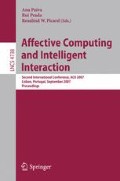Abstract
We use a χ 2 analysis on our spoken dialogue tutoring corpus to investigate dependencies between uncertain student answers and 9 dialogue acts the human tutor uses in his response to these answers. Our results show significant dependencies between the tutor’s use of some dialogue acts and the uncertainty expressed in the prior student answer, even after factoring out the answer’s (in)correctness. Identification and analysis of these dependencies is part of our empirical approach to developing an adaptive version of our spoken dialogue tutoring system that responds to student affective states as well as to student correctness.
Access this chapter
Tax calculation will be finalised at checkout
Purchases are for personal use only
Preview
Unable to display preview. Download preview PDF.
References
Litman, D., Forbes-Riley, K.: Recognizing student emotions and attitudes on the basis of utterances in spoken tutoring dialogues with both human and computer tutors. Speech Communication 48(5), 559–590 (2006)
Lee, C.M., Narayanan, S.: Towards detecting emotions in spoken dialogs. IEEE Transactions on Speech and Audio Processing 13(2) (2005)
Vidrascu, L., Devillers, L.: Detection of real-life emotions in dialogs recorded in a call center. In: Proceedings of INTERSPEECH, Lisbon, Portugal (2005)
Batliner, A., Fischer, K., Huber, R., Spilker, J., Noth, E.: How to find trouble in communication. Speech Communication 40, 117–143 (2003)
Liu, K., Picard, R.W.: Embedded empathy in continuous, interactive health assessment. In: CHI Workshop on HCI Challenges in Health Assessment. (2005)
Klein, J., Moon, Y., Picard, R.: This computer responds to user frustration: Theory, design, and results. Interacting with Computers 14, 119–140 (2002)
Cowie, R., Cornelius, R.R.: Describing the emotional states that are expressed in speech. Speech Communication 40, 5–32 (2003)
Pon-Barry, H., Schultz, K., Bratt, E.O., Clark, B., Peters, S.: Responding to student uncertainty in spoken tutorial dialogue systems. International Journal of Artificial Intelligence in Education 16, 171–194 (2006)
Forbes-Riley, K., Litman, D.: Analyzing dependencies between student certainness states and tutor responses in a spoken dialogue corpus. In: Dybkjaer, L., Minker, W. (eds.) Recent Trends in Discourse and Dialogue, Springer, Heidelberg (2007)
VanLehn, K., Siler, S., Murray, C.: Why do only some events cause learning during human tutoring? Cognition and Instruction 21(3), 209–249 (2003)
Litman, D.J., Forbes-Riley, K.: Correlations between dialogue acts and learning in spoken tutoring dialogues. Journal of Natural Language Engineering: Special Issue on Educational Applications 12(2), 161–176 (2006)
Graesser, A., Person, N., Magliano, J.: Collaborative dialog patterns in naturalistic one-on-one tutoring. Applied Cognitive Psychology 9, 495–522 (1995)
Tsukahara, W., Ward, N.: Responding to subtle, fleeting changes in the user’s internal state. In: Proceedings of the SIG-CHI on Human factors in computing systems, pp. 77–84. ACM Press, New York (2001)
Forbes-Riley, K., Rotaru, M., Litman, D., Tetreault, J.: Exploring affect-context dependencies for adaptive system development. In: Proc. NAACL-HLT (2007)
Author information
Authors and Affiliations
Editor information
Rights and permissions
Copyright information
© 2007 Springer-Verlag Berlin Heidelberg
About this paper
Cite this paper
Forbes-Riley, K., Litman, D. (2007). Investigating Human Tutor Responses to Student Uncertainty for Adaptive System Development. In: Paiva, A.C.R., Prada, R., Picard, R.W. (eds) Affective Computing and Intelligent Interaction. ACII 2007. Lecture Notes in Computer Science, vol 4738. Springer, Berlin, Heidelberg. https://doi.org/10.1007/978-3-540-74889-2_59
Download citation
DOI: https://doi.org/10.1007/978-3-540-74889-2_59
Publisher Name: Springer, Berlin, Heidelberg
Print ISBN: 978-3-540-74888-5
Online ISBN: 978-3-540-74889-2
eBook Packages: Computer ScienceComputer Science (R0)

